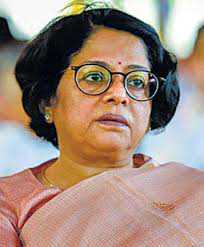Lone woman judge dissents: Justice Indu Malhotra''s verdict on Sabarimala case
Satya Prakash
Tribune News Service
New Delhi, September 28
Justice Indu Malhotra—the lone woman judge on the five-judge Constitution Bench—on Friday surprised many by delivering a dissenting verdict in the Sabarimala Temple entry case in which four of her brother judges allowed women of all age groups to enter the famous Lord Ayyappa Temple.
In a strong dissent, Justice Malhotra disagreed with almost all important points in the majority verdicts delivered by Chief Justice of India Dipak Misra and Justice AM Khanwilkar and the concurring ones by Justice RF Nariman and Justice DY Chandrachud, who declared the Sabarimala Temple did not constitute a religious denomination.
Justice Malhotra said such an issue could not be decided without a proper trial as it “is a mixed question of fact and law”. The temple was entitled to protection under Article 26 as a religious denomination, she said.
She went on to uphold the restriction on entry of women in the age group of 10 to 50 years in the temple saying: “In a secular polity, issues which are matters of deep religious faith and sentiment, must not ordinarily be interfered with by Courts”. She also upheld the validity of Rule 3(b) of the Kerala Hindu Places of Public Worship (Authorisation of Entry) Rules, 1965, which was declared invalid by the majority.
“The right to equality under Article 14 in matters of religion and religious beliefs has to be viewed differently. It has to be adjudged amongst the worshippers of a particular religion or shrine, who are aggrieved by certain practises which are found to be oppressive or pernicious… the worshippers of this Temple believe in the manifestation of the deity as a ‘Naishtik Brahmachari’. The devotees of this Temple have not challenged the practises followed by this Temple, based on the essential characteristics of the deity,” she said.
Justice Malhotra also disagreed with Justice Chandrachud’s conclusion that the practice amounted to untouchability.
“The customs practised by the devotees at the Sabarimala Temple do not flow from any practise associated with untouchability under Article 17. The custom is not based on any alleged impurity or disability,” Justice Malhotra said rejecting the petitioners contention that the restriction amounted to untouchability.
Batting for protection of diverse religious practices, she said: “The Constitution ensures a place for diverse religions, creeds, denominations and sects thereof to co-exist in a secular society. It is necessary that the term ‘religious denomination’ should receive an interpretation which is in furtherance of the Constitutional object of a pluralistic society”.
She said: “The equality doctrine enshrined under Article 14 does not override the Fundamental Right (to religion) guaranteed by Article 25 to every individual to freely profess, practise and propagate their faith, in accordance with the tenets of their religion”.
“Constitutional Morality in a secular polity would imply the harmonisation of the Fundamental Rights, which include the right of every individual, religious denomination, or sect, to practise their faith and belief in accordance with the tenets of their religion, irrespective of whether the practice is rational or logical,” she noted.
Justice Malhotra said, “The issues raised in the present Writ Petition have far-reaching ramifications and implications, not only for the Sabarimala Temple in Kerala, but for all places of worship of various religions in this country, which have their own beliefs, practices, customs and usages, which may be considered to be exclusionary in nature.”
She said: “The practice of celibacy and austerity is the unique characteristic of the deity in the Sabarimala Temple. Hindu deities have both physical/temporal and philosophical form. The same deity is capable of having different physical and spiritual forms or manifestations. Worship of each of these forms is unique, and not all forms are worshipped by all persons. The form of the deity in any temple is of paramount importance”.
“Worship has two elements—the worshipper, and the worshipped. The right to worship under Article 25 cannot be claimed in the 65 absence of the deity in the particular form in which he has manifested himself.”
“Religion is a matter of faith, and religious beliefs are held to be sacred by those who share the same faith. Thought, faith and belief are internal, while expression and worship are external manifestations thereof. In the case of the Sabarimala Temple, the manifestation is in the form of a ‘Naishtik Brahmachari’”.
The belief in a deity, and the form in which he has manifested himself is a fundamental right protected by Article 25(1) of the Constitution. The phrase “equally entitled to”, as it occurs in Article 25(1), must mean that each devotee is equally entitled to profess, practise and propagate his religion, as per the tenets of that religion.
“In the present case, the celibate nature of the deity at the Sabarimala Temple has been traced by the Respondents to the Sthal Purana of this Temple chronicled in the ‘Bhuthanatha Geetha’. Evidence of these practises are also documented in the Memoir of the Survey of the Travancore and Cochin States written by Lieutenants Ward and Conner published in two parts in 1893 and 1901,” she said, adding the practice has been followed consistently since time immemorial.
“In the present case, the character of the temple at Sabarimala is unique on the basis of centuries old religious practises followed to preserve the manifestation of the deity, and the worship associated with it. Any interference with the mode and manner of worship of this religious denomination, or sect, would impact the character of the Temple, and affect the beliefs and practises of the worshippers of this Temple,” Justice Malhotra said, upholding the contention of the Temple Thanthri, the Travancore Devaswom Board that manages the temple and believers of Lord Ayyappa.
Unlock Exclusive Insights with The Tribune Premium
Take your experience further with Premium access.
Thought-provoking Opinions, Expert Analysis, In-depth Insights and other Member Only Benefits
Already a Member? Sign In Now










